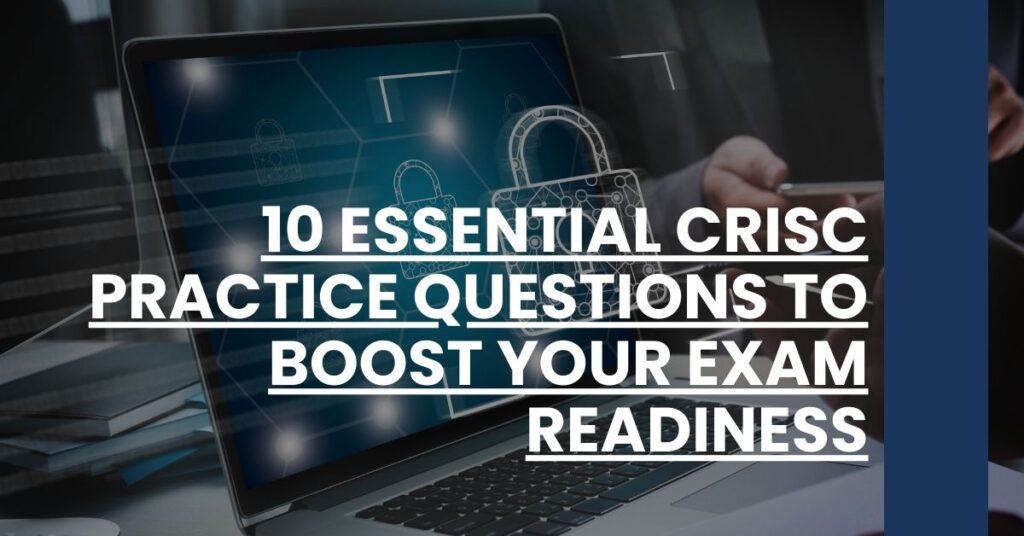Are you ready to chart a course through the risks of IT with confidence? Mastering CRISC practice questions is crucial.
Within this article, you’ll unlock strategies to prime you for the CRISC certification, blending expertise with essential practice insights. Efficiently tailored for aspiring professionals, this guide is your ally in navigating the complexities of risk management.
- 1. Understanding the CRISC Exam Structure
- 2. Key Topics Covered in CRISC Questions
- 3. Question Analysis Techniques
- 4. Time Management Tips for Practice Tests
- 5. Identifying Common Pitfalls in Answers
- 6. Utilizing CRISC Practice Questions Effectively
- 7. The Value of Full-Length Practice Exams
- 8. Reviewing Incorrect Answers to Improve
- 9. Resources for Quality CRISC Practice Questions
- 10. Planning a Study Schedule with Practice Questions
- Related Topic: Official CRISC Exam Updates and Changes
- Related Topic: The Role of Discussion Groups in Exam Prep
- Related Topic: Leveraging Technology for CRISC Exam Practice
- Conclusion: Your Pathway to CRISC Certification Success
1. Understanding the CRISC Exam Structure
When setting out to conquer the CRISC exam, it’s essential to begin with a clear blueprint of what you’re up against. Imagine entering a labyrinth with an intricate map in hand – that’s the confidence you achieve when you understand the architecture of the CRISC exam.
- Exam Format: The challenge comprises 150 multiple-choice questions, covering a myriad of scenarios that test your prowess in risk management.
- Time Allocation: You are allotted 240 minutes, a span in which strategic pacing is as vital as your knowledge.
- Domains of Knowledge: The content is segmented into four indispensable realms: identifying, assessing, and controlling risk, as well as risk and control monitoring and reporting. This is more than an exam; it’s a holistic assessment of your capability to thrive in the field of risk and information systems control.
For an in-depth look at how the CRISC exam is fashioned and the skills it’s designed to measure, visit ISACA’s exam content outline.
2. Key Topics Covered in CRISC Questions
Excellent CRISC practice questions simulate the richness of topics you’ll encounter on the actual exam. Diving into the sea of risk management knowledge, consider focusing on areas that will most likely appear on your testing journey:
- Grasp the foundations of IT Risk Identification, understanding how to pinpoint potential hazards that lurk within IT systems.
- Build your expertise in IT Risk Assessment, where evaluating the severity and the probability of risks is critical.
- Cultivate strong strategies for Risk Response and Mitigation, learning how to prioritise and implement controls to diminish risks.
- Finally, finesse your approach to Risk and Control Monitoring and Reporting – the art of keeping a vigilant eye on the effectiveness of your risk strategy.
For an accurate depiction of how these topics are weighted on the exam, peruse the CRISC exam content outline.
3. Question Analysis Techniques
Each CRISC practice question is an opportunity to fine-tune your understanding. It’s not just about getting the right answer, but mastering the analytic and critical thinking skills crucial to your success:
- Dissecting Scenarios: Unpack the layers of each question, ensuring you’ve identified all the components before deciding on an answer.
- Identifying Keywords: Be vigilant for terms that are pivotal to interpreting the question correctly, words that could change the meaning and hence the answer, such as “most,” “best,” or “primary.”
- Eliminating Distractions: Learn to weed out the irrelevant information that’s there to test your focus and judgment.
Adopting these analysis techniques is instrumental for your practice. You can learn more through the recommendations on question analysis.
4. Time Management Tips for Practice Tests
As the adage goes, “Time is of the essence,” and in the context of the CRISC exam, this couldn’t be more true. Here’s how you can sharpen your time management skills:
- Sample Question Drill: Regularly practicing with sample questions will improve your speed and accuracy, preparing you for the real deal.
- Timed Sessions: Use a clock to simulate exam conditions, gradually increasing your endurance to sustain focus throughout the entire duration of the practice test.
- Pace Yourself: Learn the rhythm that allows for both prudence and promptness – aim to have sufficient time for a final review before the clock winds down.
Develop a time management plan with the insights provided in how to ace your CRISC exam.
5. Identifying Common Pitfalls in Answers
When practicing for your CRISC, beware of the traps. Common pitfalls can be the chasm between a pass and a fail, but recognizing them in your CRISC practice questions steers you away from missteps:
- Over-reliance on Memory: Knowledge recalls is necessary, but understanding concepts will help you navigate through trickier questions.
- Misinterpreting the Question: Ensure that you’ve read each question thoroughly and have understood what’s being asked.
- Second-Guessing Yourself: Trust your first instinct unless you’ve found definitive evidence that an alternative answer is correct.
Guard yourself against frequent errors by affirming your knowledge against reliable study resources and ensuring you’re not misled by common misconceptions.
6. Utilizing CRISC Practice Questions Effectively
Smart utilization of CRISC practice questions can significantly propel your preparation. Here are some strategies for getting the most out of each question:
- Create a Study Roadmap: Establish what you need to cover and when, ensuring your journey has clear milestones.
- Active Practice: Engage with each question critically, articulating why an answer is correct or incorrect.
- Progress Tracking: Keep a log of your scores and the time taken for each session to gauge improvements and identify areas needing further study.
Aligning your study habits with these suggestions can dramatically increase the efficiency of your prep work. Discussions with fellow CRISC aspirants have highlighted these effective habits for using practice questions, as can be seen in this community forum.
7. The Value of Full-Length Practice Exams
Full-length CRISC practice exams are the closest replication of the actual test-taking experience. By engaging in them:
- Build Exam Stamina: You will adapt to the mental and physical demands of sitting through a lengthy test.
- Refine Your Strategy: These exams allow you to develop and hone your time-management strategy under realistic conditions.
- Identify Weak Spots: You can pinpoint specific domains where your knowledge may be lacking, allowing targeted improvements.
The practice of taking full-length exams is highly recommended across educational platforms for its benefits in preparation endurance and exam strategy refinement. Embrace this practice as it’s a vital component of a well-rounded study plan.
8. Reviewing Incorrect Answers to Improve
In the journey towards CRISC certification, your errors are not just stumbling blocks but stepping stones to your success. Reviewing incorrect answers you make on CRISC practice questions is akin to a gardener pruning plants: it’s a way to grow stronger and more resilient. Here’s how you can turn mistakes into lessons:
- Understand the ‘Why’: Dig into the rationale behind each incorrect response. Was it a misread question or a gap in your knowledge? Understanding the root cause will prevent the same mistake in the future.
- Clarify Concepts: Anytime you falter, return to the study material to clarify concepts. A solid foundation is essential to confidently navigate through complex CRISC questions.
- Refine Your Approach: Use errors to refine your test-taking strategy. Are there patterns in the types of questions you get wrong? Adapt your method accordingly.
Investing time in understanding your missteps is not only wise but necessary. To further sharpen your skills, consider using practice questions as learning tools, turning every wrong answer into a foothold for knowledge.
9. Resources for Quality CRISC Practice Questions
Quality resources are like treasure maps, guiding you to the valuable practice questions you need for success. You intend to ace the CRISC exam, and to do that, you must train with the best possible material. Here are some trustworthy sources to enhance your preparation:
- Official ISACA Resources: Access the authentic question pool directly from the creators of the CRISC exam, ensuring your practice is aligned with the exam standards.
- Accredited Study Guides: Seek out study guides and preparation books that have been vetted and approved by risk management professionals.
- Online Forums and Communities: Engage with peers and experts alike on platforms dedicated to CRISC exam prep for diverse insights and tips.
Leveraging the right mix of resources, including official study guides and forums, can make all the difference in your CRISC exam performance. When it comes to practicing, the quality of the questions is just as important as the quantity.
10. Planning a Study Schedule with Practice Questions
Integration is the name of the game when it comes to planning your CRISC study schedule. You want to weave CRISC practice questions throughout your strategy to continuously assess and build your knowledge. Here’s a blueprint for crafting a study plan that incorporates practice questions effectively:
- Establish a Timeline: Determine how much time you have until the exam and divide that into focused study periods.
- Allocate Topics to Study Blocks: Break down the topics across the four domains and assign them to your schedule.
- Integrate Practice Questions: At the end of each study block, test your understanding with practice questions to reinforce the material.
Creating a study schedule that integrates practice questions is a strategy endorsed by seasoned professionals. It helps ensure that by the time you reach your exam date, you’ve not only covered all areas but also practiced applying your knowledge.
Related Topic: Official CRISC Exam Updates and Changes
Staying abreast of the latest CRISC exam updates is vitally important. Changes in the exam’s content or structure can influence the relevance of your practice questions and your overall study approach. Regularly check in with ISACA for the most current information to ensure that your prep work is in line with the latest exam version.
Related Topic: The Role of Discussion Groups in Exam Prep
Sometimes the spark you need to illuminate a tricky concept comes from someone else’s perspective. Participation in discussion groups or forums can be tremendously beneficial. They offer you the opportunity to:
- Pose Questions: Request clarification on complex topics or ask for advice from those who have already achieved certification.
- Share Insights: Contribute your understanding of certain topics to help others, reinforcing your own knowledge in the process.
- Gain Moral Support: Preparing for the CRISC exam is a rigorous process, and being part of a community can provide much-needed encouragement.
The beauty of joining study groups lies in the collective brainpower and motivation they provide as you prepare to tackle your CRISC exam.
Related Topic: Leveraging Technology for CRISC Exam Practice
In today’s digital world, harnessing technology for CRISC exam preparation can give you an edge. From mobile apps to online courses, there’s a plethora of tools designed to match your lifestyle and study preferences. Use this technology to:
- Access Practice Questions Anytime, Anywhere: Maximize spare moments by reviewing questions on your phone or tablet.
- Customize Practice Tests: Many digital platforms enable you to create practice tests tailored to your current study focus.
- Track Your Progress: Apps often come with built-in analytics to help you monitor your performance over time.
Discover how integrating digital study aids in your preparation plan can streamline your study process and boost your efficiency.
Conclusion: Your Pathway to CRISC Certification Success
By now, you’ve grasped the transformative power of CRISC practice questions and their role in nurturing your exam readiness. Your journey to certification demands not just hard work but also high-quality preparation. Remember, each practice question is a catalyst for your learning – an invitation to explore, to understand, and to challenge yourself.
Go forth with confidence, knowing that you carry the torch of knowledge, illuminated by the best strategies and resources at your disposal. Your CRISC certification is not just a testament to your expertise but a commitment to excellence in the domain of risk and information systems control. Ready, set, achieve!

